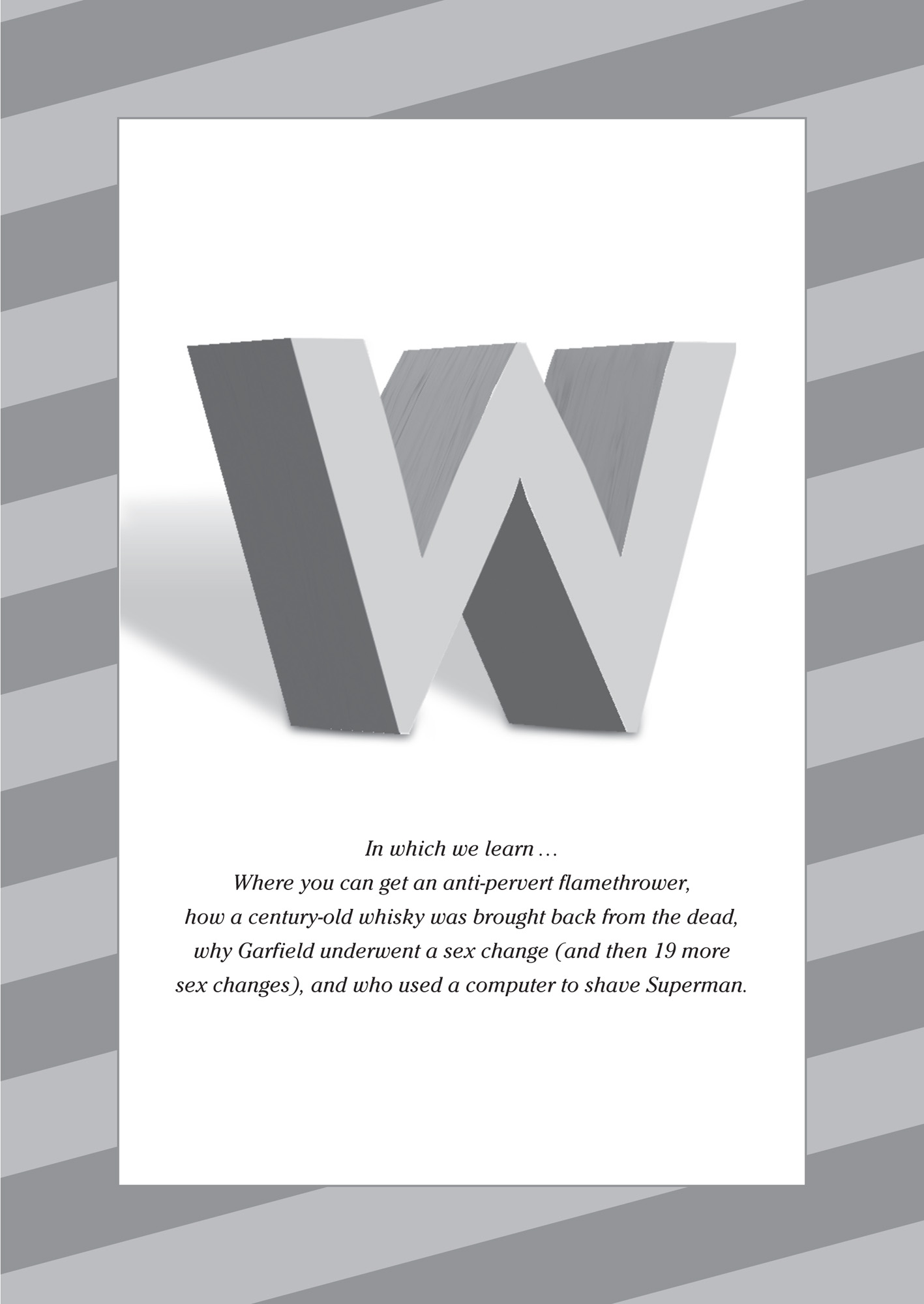

WALES▶
For a dog that chased a stick too far, see Drones; for a politician’s ‘very English’ Welsh wife, see French Presidential Election; for JH11 HAD, see Licence Plates; for a hiking book that triggered a General Election, see May, Theresa; and for a felon with a hefty bill, see Phones.
WALLS▶
Germany announced it will build a wall around the Berlin Wall.
Next year the German government will erect a protective barrier in front of the remaining relics of the Berlin Wall, to stop tourists chiselling bits off or writing their own graffiti on top of the existing graffiti (which now qualifies as historic artwork). The current plan is for a 1-metre-high barrier on both sides, with signs in several languages asking people not to break off bits of the wall.
Other countries have been engaged on more ambitious wall-building projects (see Border Wall). The Turkish government built the longest border wall in the world: a 556-kilometre structure between Turkey and Syria, covering most of the border between the two countries. The ultimate aim is for it to run along the whole 911 kilometres, which will make it the second-longest structure in the world after the Great Wall of China.
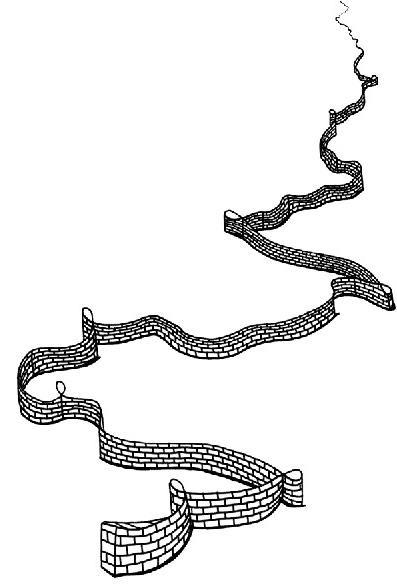
One wall that won’t trouble the Great Wall of China’s record is the kilometre-long wall that has been built between Peru and Ecuador. It has caused controversy, though: Peru recalled its ambassador from Quito in protest, arguing that despite Ecuador’s assurances that it was a flood precaution, it would just mean that any flooding that does happen will occur in Peru.
One of the few nations to rule out building a wall was South Africa. Some South Africans wanted a huge wall on the border with Mozambique to eliminate cross-border crime. However, the deputy president, Cyril Ramaphosa, said, ‘We are a nation that does not build walls. We do not believe in building walls. And that defines who we are.
‘And besides,’ he added, ‘we don’t have the money.’
WARNINGS▶
For extreme violence, see Game of Thrones; for scenes of a sexual nature, see Kinky; for flashing images, see Northern Lights; and for strong language, see Swearing.
WASPS▶
Women were warned not to put wasps’ nests in their vaginas.
Gynaecologist Dr Jen Gunter published this sensible advice on her blog after discovering that a product called manjakani, which some claim enhances vaginal tightness, was being sold by various online stores. Manjakani, or oak galls, are the tumour-like growths that an oak tree produces when a wasp injects its larvae into it; the galls enclose the developing larvae until they’re ready to emerge. Gunter warned that pulverising manjakani and inserting them into vaginas a) would be ineffective as there’s no evidence they can tighten vaginas, and b) could be potentially harmful. The galls contain tannic acids, which can dry out the vaginal wall, making it susceptible to abrasion and tearing. This, in turn, can encourage STDs to spread more easily.
It was a tough year for gall wasps. While their homes were being pulverised and inserted into people’s genitals, their bodies were being possessed by a newly discovered species. The parasite, named the crypt-keeper wasp, deposits its larvae in a gall alongside young gall wasps. When a larva hatches, it burrows into the head of the gall wasp and controls its mind from within. Usually a gall wasp, once it’s fully grown, chews its way out of the host tree. But when it’s possessed by the crypt-keeper, it chews a hole that’s too small, and gets its head wedged in it. While it’s trapped there, the crypt-keeper eats its head from within and makes its own way to freedom through the trapped gall wasp’s skull.
In yet more bad news for wasps, entomologists at University College London and the University of Gloucestershire encouraged members of the public to start drowning wasps in beer. As part of the Big Wasp Survey, the scientists hoped to find out more about British wasp populations by persuading people to send them dead ones for analysis. The Big Wasp Survey published tips on how to make alcohol traps for the creatures, explaining that it was simply ‘harnessing the public hatred of wasps’ in order to discover more about them. Although charities like Buglife objected to the planned slaughter, the project should actually conserve wasp populations in the long term by showing researchers where certain species are in decline, and which ones need protecting.
WAXWORKS▶
The day after the 45th US president was inaugurated, an auctioneer in Pennsylvania flogged the previous 44.*
The Hall of Presidents and First Ladies in Gettysburg closed late last year due to falling visitor numbers, and so the life-size models of everyone from Washington to Obama went under the hammer. All of the First Ladies of the United States were also up for sale, but they weren’t life-size. They were made a third of the size of their husbands to save on wax.
Abraham Lincoln was the most expensive president sold by auctioneer Randy Dickensheets. His waxwork went for $9,350, while James Monroe was the cheapest at just $1,100. The cheapest First Lady was Sarah Yorke Jackson, who was sold for only $192.50, possibly due to the fact that she wasn’t actually married to Andrew Jackson – she was married to the president’s adopted son.
There was no Trump waxwork at this auction, of course, but museums around the world rushed to display his likeness. The Grévin museum, in France, only just managed to get its Trump waxwork ready in time for his first day in the White House. The museum was so sure of a Hillary Clinton victory that it had already half finished a Hillary statue before it had to change tack quickly. Madame Tussauds in London unveiled its Trump just days before the inauguration. The team at the museum said that the most difficult part of the model to get right was the hair. They made it with a mixture of human, yak and squirrel.
WEAPONS▶
Anti-pervert flamethrowers went on sale in China.
The devices are often advertised as small enough to fit in a handbag (though they come in a range of shapes and sizes) and are intended to help women fend off unwanted advances. Police have warned that they’re illegal, but sellers argue that they are, at least, non-lethal. They do admit, though, that they can cause permanent scarring and disfigurement. Some versions shoot fire for half a metre at temperatures of 1,800°C. To protect themselves from perverts, Chinese women can also buy rings that function as spikes, knives disguised as credit cards, and daggers concealed in key rings.
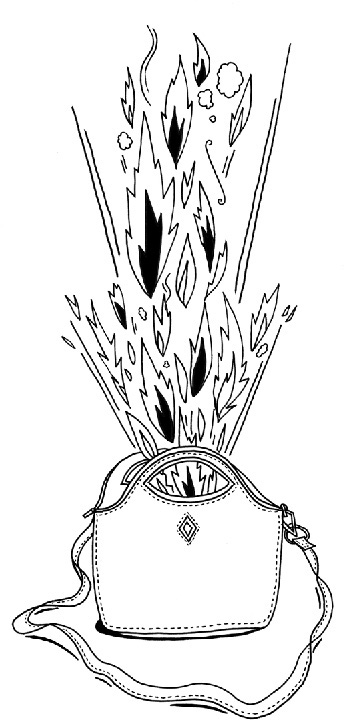
Another weapon craze worrying the Chinese authorities is the fashion for toothpick crossbows. The tiny, handheld crossbows are marketed as children’s toys, but can project their toothpick arrows up to 20 metres. While this is worrying enough, the real problem is that toothpicks can be swapped for nails and needles, at which point the weapon is powerful enough to crack glass. Parents expressed such concern that the government banned the weapons, although they are still widely available to buy – mostly in shops near schools and playgrounds.
WEBSITES▶
For colossalbellend.com, see Inauguration; for superbigcocks.com, see Internet; for iambeingsuedbythedonald.com, see Lawsuits, Trump’s 134; and for kylie.com, see Trademarks.
WEDDINGS▶
Six hundred people went to Pippa Middleton’s wedding: 300 guests, and 300 members of the public who were allowed to stand in a pen outside the venue.
Some people wondered if the select group of 300 locals was placed there to obscure the view of photographers. The wedding organisers certainly put in a lot of effort to make sure only invited guests got into the grounds: every member of the party had to send a passport photo beforehand for security purposes.
The Daily Mail estimated that Pippa’s wedding cost just over £1 million. There were more than 20,000 canapes, the staff serving food and drink were all models, and the Portaloos had oak fittings, porcelain basins, spot lighting and full-length mirrors.
But Pippa’s wedding was not the biggest of the year. Lolita Osmanova, the daughter of a Russian oligarch, was married in the theatre where the Oscars take place, with music performed by Lady Gaga and Jason Derulo. The flowers alone cost $500,000.
At the other end of the scale, a man in China was arrested for paying 200 people to come to his wedding and pretend to be his friends. The bride and her family became suspicious when none of them could explain how they knew him. They eventually admitted they’d been paid the equivalent of £9 each to pose as his friends for the day. The groom, Mr Wang, was investigated on suspicion of defrauding his bride’s family out of 1.25 million yuan (nearly £150,000) during their courtship. The silver lining for her was that their marriage was invalid because although he’d claimed he was 27, he turned out to be 20, and in China the minimum age at which men can marry is 22.
WHISKY▶
A whisky was brought back from extinction thanks to Ernest Shackleton.
The new whisky has been named Shackleton, and is based on a lost recipe produced in the early 1900s by Mackinlay & Co. In 2007, three cases of century-old whisky were found frozen into the ice at Shackleton’s Antarctic base camp. They had lain there since his 1907 expedition. Despite having been under the ice for exactly a century, the whisky itself hadn’t frozen and was still drinkable.
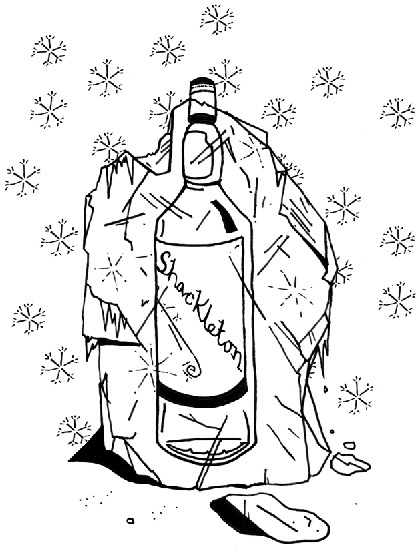
Whyte & Mackay, which now owns Mackinlay & Co., decided to replicate the whisky. A crate of it was sent to Scotland and handed over to master blender Richard Paterson, aka ‘The Nose’. Paterson is a master distiller who last year celebrated 50 years in the industry. His skills at tasting and blending whiskies are so valuable that his nose was once insured for £1.6 million.
Paterson sampled the whisky by inserting a syringe between the cork and the bottle neck, and extracting enough liquid for the purposes of analysis and imitation. It took him months to recreate the blend. Once Paterson was done, the original bottles were returned to Shackleton’s hut in Antarctica and placed back under the hut, as part of a programme to protect the legacy of Antarctic exploration that took place between 1898 and 1915.
Every single drop of the original whisky will remain undrunk – except for one small vial, that is, which now sits in the pocket of a man called The Nose.
WHITE HOUSE, WINTER▶
The walls of the winter White House are covered in fake news.
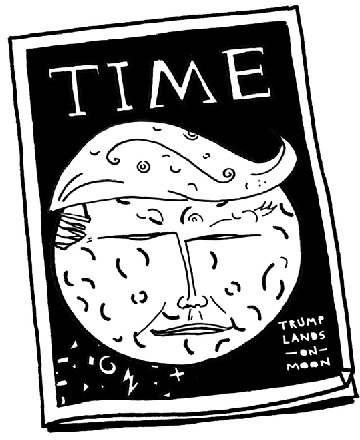
Time magazine asked the Trump Organization to take down a fake version of its cover that hangs on the walls of Donald Trump’s Florida property, Mar-a-Lago.
A reporter noticed the mocked-up magazine cover while visiting one of Trump’s golf clubs. It soon emerged that it also hangs in three others, including Mar-a-Lago. Time requested that they be removed, and published an article entitled ‘How to Spot a Fake TIME Cover’. The framed front covers, supposedly from 2009, show a photograph of Trump accompanied by the words ‘Trump is hitting on all fronts’ and ‘The “Apprentice” is a television smash!’ In reality, that edition featured Kate Winslet on the cover.*
Trump, incidentally, spends about a quarter of his time at Mar-a-Lago, so lobbyists who want to get his attention have obtained its IP address and started geotargeting their online materials to the estate. The president and his staff in the property are now flooded with adverts very specifically meant for them while they’re there.
Curiosity about what actually goes on at Trump’s properties has led Democrats to introduce a bill demanding greater openness. The bill is called Making Access Records Available to Lead American Government Openness Act, though it’s better known by its acronym, MARALAGO. What we do already know is that the place is a health and safety hazard: in April, inspectors recorded 13 violations of food safety there, including incorrectly prepared fish, and raw meat kept at temperatures too high to be safe.
Arguably, Mar-a-Lago is finally fulfilling the purpose its original owner, Marjorie Merriweather Post, intended for it. She left it to the US government in her will, hoping it would become a de facto winter White House. Unfortunately, no president wanted to live there and it was on the verge of being demolished when Trump discovered it. His offer of $15 million was initially rejected, so he bought the land between the Mar-a-Lago and the ocean and threatened to build a hideous house (his own admission) there in order to block Mar-a-Lago’s sea view. This drove the price down, enabling Trump to purchase it in 1985 for $5 million.
Trump’s decision to pull America out of the Paris climate agreement may cause Mar-a-Lago’s value to depreciate further. Projections released this year by the National Oceanic and Atmospheric Administration suggest that most of the property will be underwater by 2100.
WIKIPEDIA▶
Garfield had 20 sex changes in two days.
In an interview a couple of years ago, Garfield the cat’s creator said the cartoon character is ‘not really male or female’. When satirist Virgil Texas recently came across the interview, he went to Wikipedia and changed Garfield’s gender to ‘None’. An edit war then broke out. Over the next 60 hours his/her/their sex switched back and forth constantly, until Wikipedia’s administrators lost patience and suspended all editing on the page.
Wikipedia also suspended editing of its Calibri page after it turned out the history of the font was being used as evidence in a huge Pakistani corruption investigation that led to the resignation of Prime Minister Nawaz Sharif.* Sharif’s daughter Miriam, who was herself being investigated for corruption, showed a court documents dated 2006, typed in Calibri font. However, Calibri only became available in 2007. When this fact emerged, another edit battle began, with supporters of Sharif updating the page to say that the font had been available since 2004, presumably in order to get the PM out of trouble.
Machines have editing wars on Wikipedia, just like humans. Oxford University researchers have found pairs of bots that have been undoing and redoing each other’s work for years, sometimes arguing over extremely small points of grammar. The fights they have are often down to their nationality: it turns out that bots behave differently depending on which country they were built in. German bots are the least argumentative, while Portuguese are the most quarrelsome. English Wikipedia bots undo each other’s work three times as often as English Wikipedia humans.
All this confusion might explain why China just made its own version of Wikipedia that doesn’t allow editing. It’s been set up by the publishing house that produces the physical Encylopaedia of China, and the government intends it to be a rival to Wikipedia. A team of 20,000 government-approved experts and academics has been employed to write it. No one else will be allowed to contribute.
WINE▶
French and Spanish ministers called for a truce in the ‘War of the Wines’.
France and Spain’s agricultural ministers were forced to meet to defuse the furious battle French vintners have been waging against imports of cheap Spanish plonk. The French think Spanish winemakers have been cheating by giving their bottles misleadingly French names and putting pictures of baguettes on them.
This year, protesters from France’s militant vintner alliance CRAV (Comité Régional d’Action Viticole, or Regional Action Committee of Winemakers) continued their protests, which consist of attacking tankers of Spanish wine and throwing cocktails (Molotov, specifically) at premises that store it. In March, the French agriculture minister appealed for calm after seven tankers full of wine were poured onto the ground. Two months earlier, CRAV found a tanker suspected of carrying foreign wine, interrogated the driver, and, on learning that it was Spanish, dumped it all over the highway.
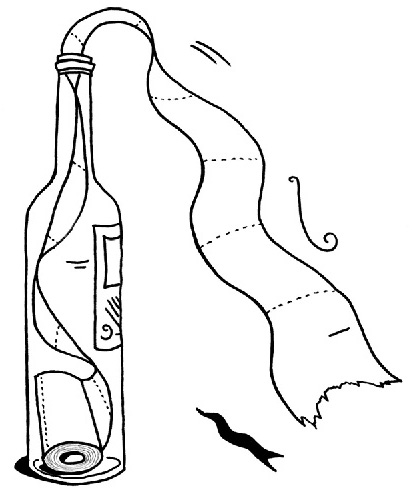
This conflict has been rumbling on for some time. Last year French farmers hijacked Spanish wine lorries and poured 90,000 bottles’ worth of wine down the drain while local French gendarmes stood by and watched. Elsewhere, balaclava-clad winemakers in a port town in Languedoc cracked open vats of imported wine, flooding the streets and people’s homes with thousands of litres of cheap booze.
There was a bit of good news for drinkers of both French and Spanish wine after a US study on mice suggested that red wine prevents muscles from ageing. It’s down to a chemical compound called resveratrol. Unfortunately, to get the equivalent amount of resveratrol to the mice in the study, the average human would need to drink at least 2,000 bottles of wine a day.
WITCHCRAFT▶
Canada’s government is trying to legalise ‘pretending to be a witch’.
The C-51 bill is an attempt by the liberal government to tidy up old legislation, some of which dates back to colonial times. Among the laws that they propose scrapping is one that states that it is illegal to ‘pretend to exercise or to use any kind of witchcraft, sorcery, enchantment or conjuration’. So if C-51 passes, it will no longer be illegal to pretend to enchant people or to practise ‘crafty science’ for fun, although it’ll still be illegal to use these methods to commit fraud. The change of law will mean that, as well as dabbling in the occult, people will be able to participate in duels, sell a ‘crime comic’, and advertise drugs as a way to restore ‘sexual virility’ – all of which are currently illegal.
Witchcraft also made a comeback over the border in the USA this year, where Blink-182 singer Matt Skiba, who claims to be a witch, claimed that his spellcasting was responsible for the failure of an upmarket music event (see Fyre Festival). And around the world, on the summer solstice, witches cast a spell to ‘Bind Trump’, calling on demons to cause him to fail.
Meanwhile, in Portugal, FC Porto accused rivals Benfica of paying a witch doctor to help them win football matches. They say that Dr Armando Nhaga was paid 1,000 euros for every game Benfica won in the domestic league and 10,000 euros for every game they won in the Champions League group stages. The magic did seem to work as Benfica won the league for the fourth year in a row, though in the first game that Nhaga was said to be employed, Benfica actually lost 4–0 to Borussia Dortmund. Most football fans would have been able to predict that result, but rather than blaming it on the form of the two teams, the witch doctor said that the Benfica team had not informed him of the correct time that he needed to cast the spell.
WONDER WOMAN▶
This summer a fired UN ambassador became the world’s biggest superhero.
Wonder Woman was the largest grossing film of the summer. Before this, in early 2016, the character was named an honorary UN ambassador. However, unlike the cases of Winnie-the-Pooh, Tinkerbell and the red Angry Bird (all UN ambassadors themselves), there was an immediate backlash, with over 40,000 people signing a petition against the appointment. The main objection was that it would be better to find a real-life woman to be an ambassador for the empowerment of women and girls. As a result, the United Nations fired her from her role.
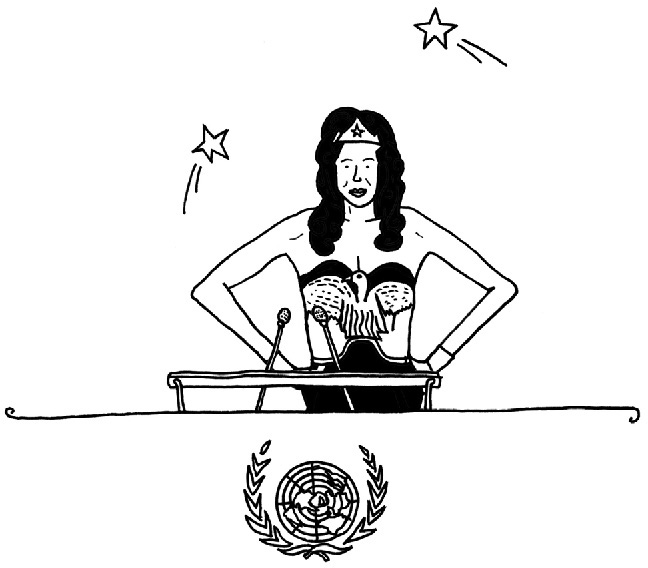
This would have been a huge disappointment to her creator, William Marston. When first promoting her, he said, ‘Frankly, Wonder Woman is psychological propaganda for the new type of woman who should, I believe, rule the world.’*
Gal Gadot, who played the lead role in the film, said the training she did for the movie was tougher than the two years of compulsory service she did in the Israeli army. Not only that, she was five months pregnant when she filmed reshoots for the film. Her Wonder Woman outfit was chopped out around the stomach and replaced with green cloth so they could CGI out her baby bump.
A similar bit of airbrushing occurred in the new Justice League movie (which also features Gadot as Wonder Woman). It has also been claimed that Henry Cavill, who plays Superman, had to do reshoots sporting a massive moustache, as they coincided with the filming of his new Mission Impossible movie. As a result, the studio had to shave Superman virtually with CGI.
WORLD RECORDS▶
For flaming stuntmen, see Game of Thrones; for long-distance runners in fancy dress, see Marathon, London; for one-fingered piano-playing, see Music; for the footballer who’s the biggest poser, see Selfies; for a coconut climbing champion, see Trees; and for a giant horse’s head, see Turkmenistan.